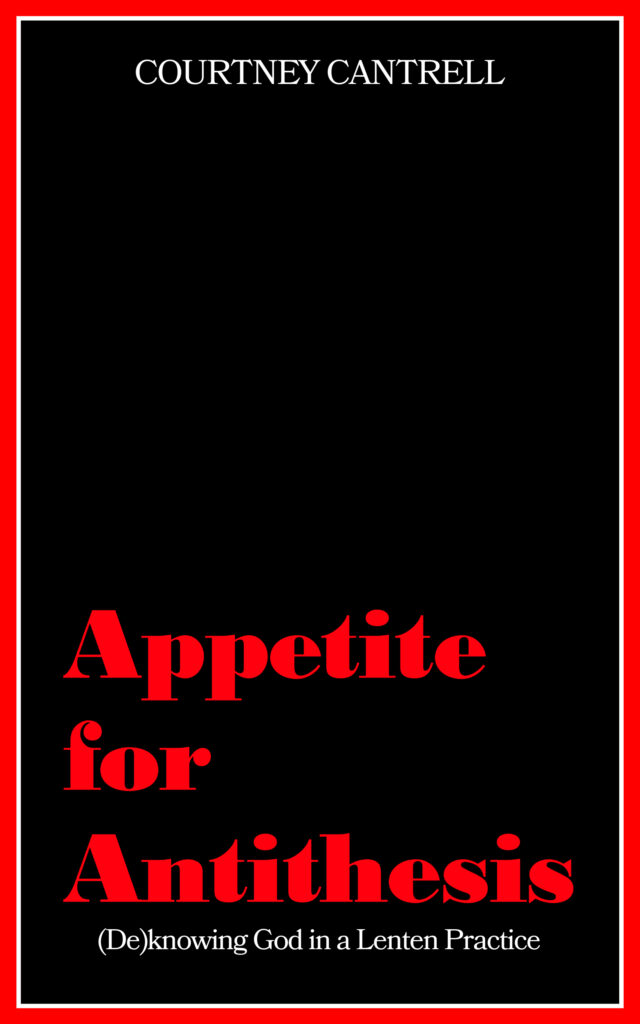Sorry, but nothing matched your search terms. Please try again with some different keywords.
finally, a new book announcement!; or: i am the worst businessperson
Recently, because of reasons, I have had occasion to give multiple people my business card (yes, I do actually have business cards! they are very old! but the info on them remains accurate! I think!). That being the case, and in view of the fact that this blog’s address is emblazoned (actually printed demurely) upon said business cards, I guess it doth behoove one to write something here about one’s most recent accomplishments and current activities.
Well, that was unnecessarily mouthful-ish.
ANYWAY, I have a new book out.
ANNOUNCING
APPETITE FOR ANTITHESIS: (DE)KNOWING GOD IN A LENTEN PRACTICE is my first ever non-fiction tome. It’s based on the practice known as “Atheism for Lent,” brainchild of philosopher and radical theologian Dr. Peter Rollins. He kindly has allowed me to pick apart his baby and dress it up in all sorts of mismatched outfits of my choosing, and he also wrote the Foreword. The man is apparently infinitely forgiving.
For a little more detail, here’s an excerpt from my Intro:
In 2023, I participated in Atheism for Lent for the third time. Or maybe the two-and-a-halfth time. This go-’round, I worked through each day’s material by posting my various thoughts and confusions on my blog….
Hoping for conversation and critique, I shared several blog links with fellow AfL participants. The feedback both helped my understanding of the material and encouraged me to keep blogging. And finally, I realized what I was doing: I was popularizing the AfL texts and visuals, making them more accessible not only to myself, but to all of us who didn’t have an extensive philosophical and/or theological background.
…It occurred to me that if it helped me and helped AfL participants of ’23, then maybe it could help AfL participants every year. And if so many AfL people deemed it useful, then maybe Peter Rollins would deem it useful, too.
Hey there, Pete, I had an idea….
And that’s how this book came to be.
It’s worth noting that this Lenten practice of atheism is not offering a new belief system. It’s the farthest thing from such an offer…and if you’re hoping for concrete answers concerning what to do with your existence every day, you will come away from this Rollinsic practice and/or this book disappointed and frustrated, if not angry. Not to mention that you’ll miss a good deal of the meat these writers and thinkers put forward for mastication, ingestion, and digestion, and, in some cases, incorporation (into-body-tion).Instead of giving us something to hold on to, Atheism for Lent aims to take (some? of) our unexamined safety nets away.
This practice is about articulating things we think we believe—and things we didn’t know we believe. It’s meant to help us look closely at the foundations we’ve considered ever firm, that we might determine just how solid they truly are. It uses a dialectic: presenting a thesis, providing a counter-thesis, and sometimes even wrapping things up in a synthesis of the two. Counter-thesis can become the new thesis—which then, itself, must be countered. And so the conversation goes on.
This dialectical practice of Atheism for Lent critiques and questions our dearest-held beliefs in a way that helps us critically discern whether or not those beliefs are functional in reality. Do they truly work for us? improve our lives? make us better people? Do they fulfill what they promise us for the now? Can they fulfill what they promise for the future?
We cannot find answers to these questions if we don’t allow something to destabilize us. We cannot find answers to these questions if we refuse to doubt.
…Hello darkness, my old friend….
I’ve been calling this book my theo-philosophical doorstop. It’s a honkin’ big book, y’all. In my defense, the bibliography is necessarily massive, because the book showcases 48 different philosophers and theologians throughout history; the writings and/or practices of several different groups of mystics; and a smattering of writers, artists, and musicians. In reading, you’ll move back and forth between theistic and atheistic belief systems, critiques of various faiths and philosophies, despair and hope, comfort and existential dread. You’ll see paintings and read about the heat death of the universe.
Oh, and you’ll read a lot about cats, because who the hell writes a philosophy book without including cats.
This book was a labor of blood. Tears and sweat happened too, but they were made of blood. It’s all blood. There aren’t even any zombies or vampires (at least, I don’t remember putting any in there, but I make no guarantees). But still, it’s all lifeblood in there. I probably need a transfusion.
Well, that was unnecessarily gory. (Maybe.)
If you follow this link, you’ll find a page listing most of the vendors where APPETITE FOR ANTITHESIS is available as an ebook:
- Kobo
- Thalia
- Apple
- Smashwords
- Angus & Robertson
- Vivlio
- Fable.
You can also find the book at:
- Barnes & Noble
- Amazon (this includes the paperback).
If you don’t see your preferred vendor, drop me a comment below, and I’ll see what I can do.
I won’t say “happy reading,” because “happy” isn’t what this book is for. So, I’ll just say…thanks.
And I hope I whet your appetite. XOXO

